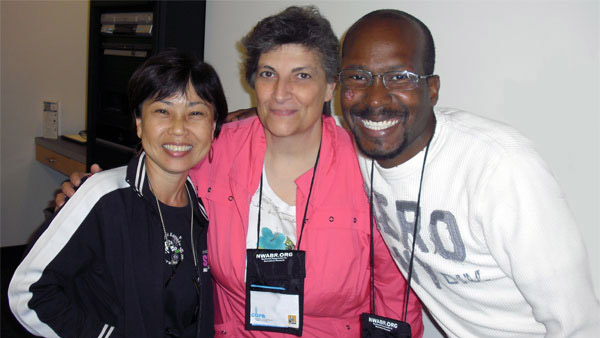
On Friday, July 29, scientists from the Washington National Primate Research Center (WaNPRC) participated in “Collaborations to Understand Research and Ethics (CURE),” a professional development program designed for science teachers. The program was developed by the Northwest Association for Biomedical Research (NWABR) and funded by a Science Education Partnership Award grant from the National Institutes of Health (NIH).
The goal of the CURE program is to provide teachers with a broad understanding of the context in which science is conducted in our society. It offers an opportunity to explore biomedical research from concept through research to clinical trials and prepares teachers to address research and ethical issues with their students. As part of the two-week program, the teachers visit various research facilities in order to acquire a first-hand view of how scientific ideas are conceptualized and how they evolve over time as research is conducted.
The WaNPRC site visit centered on the Infant Primate Research Lab (IPRL) and began with a tour of the facility. The group included five science teachers who traveled from as far away as Singapore to participate in the program. A highlight of the tour was the opportunity to view young nonhuman primates, primarily Macaca Nemestrina (pigtail macaques), in social group housing and in a separate playroom. Noelle McKain, WaNPRC research scientist, and Dr. Thomas Burbacher, director of the IPRL, lead the tour and gave in-depth explanations of the facility and various research projects. The group was shown video presentations of developmental research, including experiments based on cognitive development theory, and color and shape discrimination.
The tour was followed by presentations by three research scientists. Dr. Eliza Curnow provided an insightful overview of her specific areas of research, embryonic stem cell and reproductive biology, specifically issues involved with in vitro fertilization. Dr. Sandra Juul, research scientist and Professor of Pediatrics at the UW Medical School, spoke of her work in the UW Medical Center neonatal intensive care unit. Her research is centered on improving the neuro-developmental outcome of premature infants. Dr. Thomas Burbacher specializes in children’s environmental health concerns, including significant studies on maternal methyl mercury poisoning. He explained that environmental effects on cognitive and neurological development are increasingly important as the trend indicates an increase of issues attributable to environmental causes. The visit was summed up by WaNPRC Director, Dr. Dave Anderson, who expressed his thoughts about scientists’ care and concern for the well-being of nonhuman primates, and the greater good that comes from animal research.
CURE is an annual intensive two-week summer program geared toward science educators. For more information, contact NWABR at 206-957-3337 or visit their website: www.nwabr.org.